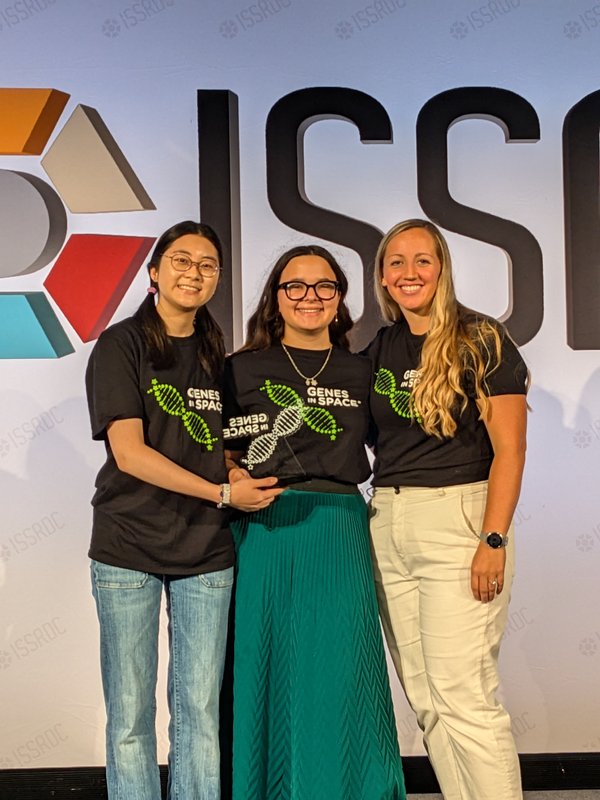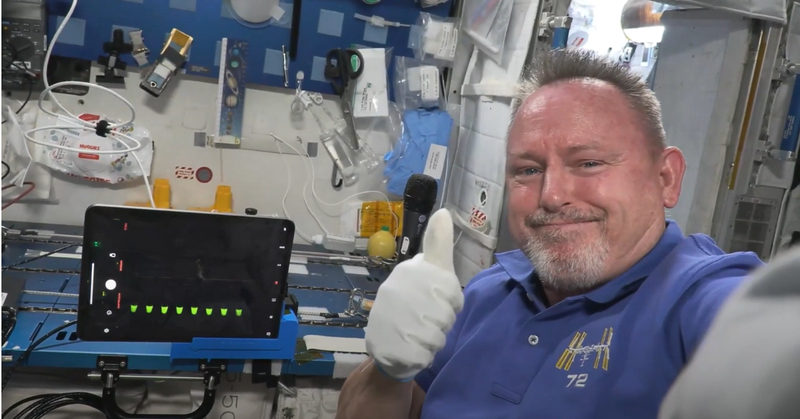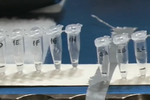2025 Genes in Space contest opens call for student proposals
The contest, entering its tenth year, offers students a chance to launch a DNA experiment to the International Space Station
Cambridge, MA, Jan. 6, 2025 – Genes in Space, an annual biology competition that invites students to solve the challenges of living and working in space, has opened a call for proposals today. Each year, the contest asks students in grades 7-12 to design innovative experiments for the International Space Station, with one winning experiment to be carried out by astronauts. The program, co-founded by miniPCR bio and Boeing and supported by the ISS National Laboratory and New England Biolabs, aims to inspire the next generation of space scientists by asking students to design original DNA experiments that address real-life challenges and opportunities in space exploration.

2024 Genes in Space winning team Julia Gross (left) and Isabelle Chuang (center) with their Harvard mentor Kayleigh Ingersoll Omdahl (right) (Photo Credit: Genes in Space)
Genes in Space has students design novel DNA experiments that utilize the Genes in Space Toolkit, a suite of biotechnology tools available aboard the ISS. In the Toolkit, essential molecular biology techniques like polymerase chain reaction (PCR) sit alongside cutting-edge tools like BioBits®, a cell-free protein expression system. Toolkit items share a common suitability for use in research environments like the ISS, where space and resources are limited.
“Students who participate in the Genes in Space competition have an opportunity to contribute significantly to our collective understanding of human health in space by testing innovative biology analysis techniques in the unique microgravity environment,” said Scott Copeland, co-founder of Genes in Space and director of ISS research integration for Boeing. “They learn practical knowledge of molecular biology tools and foster a lifelong passion for the science of space exploration.”
2025 marks the pioneering STEM competition’s tenth year. Over the last decade, winning students have been responsible for such influential space biology achievements as the first polymerase chain reaction (PCR) in space and the first use of CRISPR gene-editing technology in space. Students Julia Gross and Isabelle Chuang of New York City, NY, who won the 2024 contest, are preparing their experiment on phage therapy in space for a 2025 launch.

NASA astronaut Butch Wilmore carries out the Genes in Space-11 experiment aboard the International Space Station in November, 2024 (Photo credit: NASA)
The 2025 Genes in Space competition will close on April 14th. Contest participation does not require specialized equipment and is free to enter. Proposals may be submitted by individual students or pairs. All submissions must use the ISS as a testbed for space exploration.
Twenty-five awardees will win prize packages including miniPCR biotechnology kits for their educational institutions. Five Finalist teams will additionally receive mentoring from scientists and attend the 2025 ISS R&D Conference, where they will present their ideas to a panel of judges. The winner will attend Space Biology Camp and watch their experiment launch into space in 2026.
Media contacts:
miniPCR bio: Marc Bliss, genesinspace@minipcr.com, 781-990-8727
Boeing: Rosa Bañuelos, rosa.i.banuelos@boeing.com, (321) 313-3134

